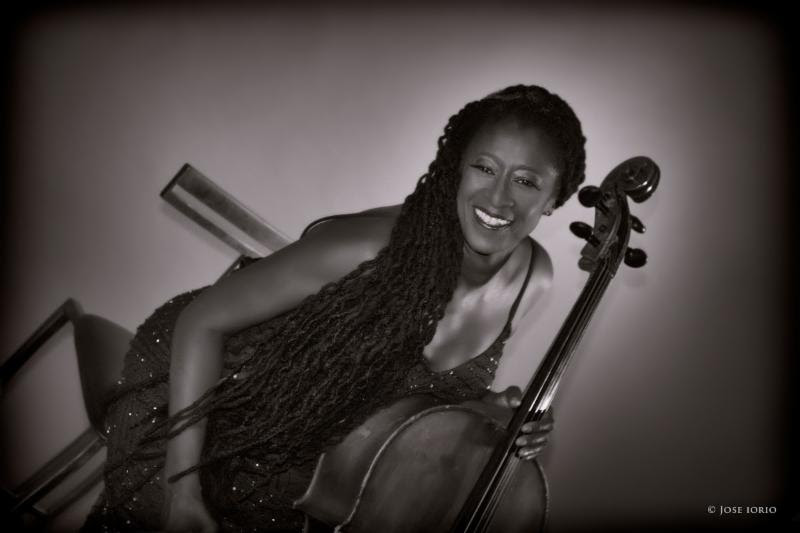Cellist/Composer/Arranger Akua Dixon
To Release Her Second CD as a Leader,
"Akua Dixon,"
On Her Akua's Music Imprint,
January 13, 2015
Follow-Up to 2011's "Moving On"
Features Dixon's String Quartet
Plus Guests Regina Carter, John Blake Jr., Kenny Davis
CD Release Shows Scheduled for
1/18 Mount Morris Ascension Presbyterian Church, NYC;
1/30 Trumpets, Montclair, NJ;
4/18 Sistas' Place Coffee House, Brooklyn;
4/24 Leonard Nimoy Thalia
at Peter Norton Symphony Space, NYC
November 18, 2014 
The project showcases
Dixon as a powerfully emotive improviser and dauntingly creative
arranger exploring sumptuous American Songbook ballads, a suave
Afro-Cuban standard, erotically charged nuevo tango, and a rootsy
Ellingtonian opus. "When I look back at my history I've written for all
different sizes of string ensembles, from duos and trios to orchestras,"
Dixon says. "But the string quartet is the easiest unit to keep
together and keep working, and it's the situation I've written for the
most."
The eponymous CD features Dixon's working string quartet (Patrisa Tomassini, first violin; Gwen Laster or Chala Yancy, second violin; and Ina Paris, viola) plus special guests like bassist Kenny Davis, violin star Regina Carter, and violin master John Blake Jr. (in one of his final recordings before his passing last August).
Also featured, on one track apiece, are Dixon's children -- drummer Orion Turre, heard on the album opener "Haitian Fight Song," and vocalist Andromeda Turre,
who contributes a swooning version of "Lush Life." "They got exposed to
a lot of different music growing up and both became wonderful
musicians," says their proud mother. "Making music for me has always
been a family affair."

Born and raised in New York City, Akua Dixon grew up in a family suffused with music. She started playing with her sister, the late violinist Gayle Dixon, shortly after the cello came into her life in the 4th grade.
After graduating from
the prestigious "Fame" High School of the Performing Arts, Dixon studied
at the Manhattan School of Music at a time when the only track
available focused on European classical music. She describes her
post-graduation gig in the pit band at the Apollo Theater as an
essential proving ground. Backing a disparate array of stars from Rev. James Cleveland and Barry White to James Brown and Dionne Warwick, she developed a vast idiomatic repertoire.
With the doors of most
symphony orchestras closed to African-American musicians (to say
nothing of women), Dixon found a home in the Symphony of the New World,
which is where she experienced the Ellingtonian epiphany that led her
to jazz. "I started immersing myself in jazz and spirituals, and became
determined to learn the secrets of improvising," she says.

Dixon collaborated closely with another jazz giant in the early 1980s as a founding member of the Max Roach Double Quartet.
She had honed her rhythmic drive backing the likes of James Brown, but
learning to phrase bebop with one of the idiom's founding fathers was an
invaluable experience.
After years of lending
her skills to recordings by masters such as Archie Shepp, Don Cherry,
Buster Williams, Carmen McRae, Dizzy Gillespie, Abbey Lincoln, Tom
Harrell, and her former husband Steve Turre, Dixon made a bold statement
of her own with 1994's Quartette Indigo
(Landmark), a classic album featuring violist Ron Lawrence and
violinists Gayle Dixon and John Blake Jr. (reissued by 32 Jazz).
Supported by a grant from the NEA to compose the music, she delivered a
brilliant second album in 1997 with Afrika! Afrika! (Savant) with Lawrence, and violinists Regina Carter and Marlene Rice.
She spent much of the
next decade immersed in education, teaching at various institutions and
conducting dozens of performances through the Carnegie Hall Neighborhood
Concert Series. With the release of Akua Dixon, however, Dixon has refocused her priorities and put her own music on the front burner.
Terri Hinte hudba@sbcglobal.net 510/234-8781 |
